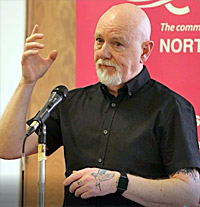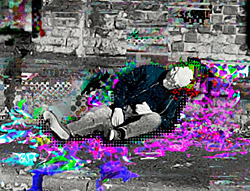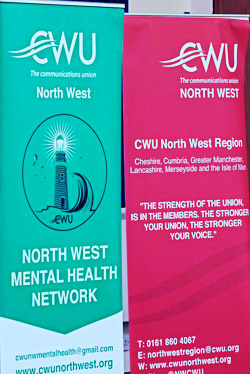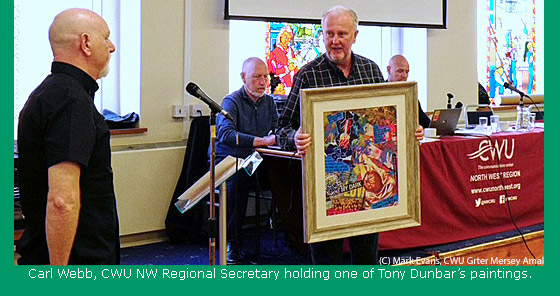 |
||
|
|
||
|
The Puddle Of A Man - Tony Dunbar's Battle With Depression
|
||
|
Nobody spoke about mental health, and it was not the thing for men especially to talk about. And it's still a stool to this day. It was considered a sign of weakness and unmanly. So for years I hid my depression. And keeping it quiet just made things worse. As Bob Dylan once wrote, the times they are a-changing. So what is my personal depression? How has it affected my life? How do I live with and manage it? And can it be cured? I now know I've been depressive all my life. My family at the time just thought I was a very, very moody kid. Friends, colleagues, managers, bosses, wives, parents, unfortunately this has been true, children, all of them she picked up on very loud, foggy, mixed up moods. Now my first realisation of depression, or my depression, came around 2015-16. So I've lived with it all my life, didn't know what it was, because nobody spoke about it. I was in Sydney, Australia. I crested a hill, I can still see it in my mind's eye now. Crested a hill and before me is the iconic Bondi Beach. I felt nothing. I was just numb. I didn't know why. I'm in the wonderful Australian sunshine, the heat. I've got this vision coming to me, and I've got no feelings at all, I'm just numb to it. That's the moment I thought, this isn't right. I've got to do something about this. So I came home, obviously I went to the doctors. I was diagnosed with clinical depression. I mean, that's a card on the table. I didn't even really know what clinical depression was. So how has it affected my life? It has created havoc and chaos. As I've said, two broken marriages, neither wife suffered with depression, both of them had to live with it, and both eventually had to leave the marriage in order to live a life away from depression. Work - I've had many jobs. I've even had several businesses of my own.
But all those jobs and businesses end in the same way, with me being unable to commit, constant breakdowns, and as I've said, the vast majority of the time, unable to talk about or explain what was going on and what was wrong with me. So life with depression can be very hard, difficult, it's unrelenting when you're in it. So how do you deal with it? How do you get through the day? This takes me back to my first diagnosis, and the doctor said they've got their armoury to deal with it. The first protocol, antidepressants. For me, this was the start of a rollercoaster ride. As with any medication, there can be side effects. Some of these medications had terrible adverse effects on me. So not only now are you dealing with depression, you're now dealing with these side effects as well. And I say this because nobody understands this, because you're trying to work and you're trying to live your life, you're suffering with depression, suddenly you've got these weird side effects at times. I mean, one just knocked me out. I was just like a zombie. You're trying to go to work and explain to humanity that you're not exactly aware of your surroundings. It's really strange, the side effects. And what happens then is you go to the doctor, you say, the side effects are doing this to me, you then have to be weaned off the medication, because it's in your system. Just like a drug, any drug, a drug addict. Then you go through six weeks of stepping down the medication to then go on another medication, and unfortunately in my case, again, side effects, weaned off for six weeks, another medication, side effects, weaned off for six weeks, another medication. All the time as this is happening, you're trying to hold down a job, keep your life on track. It's nearly impossible. Therapy, the next step. Now, I do talk about talk. So I went down a well worn path. Alcohol became my drug of choice. And for a while, it was working. It silences the voices in your head, it silences that nagging voice. But, as everybody knows, booze is never the answer. In fact, it makes things ten times worse. And it turned me into what I now call the puddle of a man. And I can introduce you to him there.
As my ex-wife and my son had to come and pick me up off the floor to try and carry me and get me into a car. Looking at me there, I'm unaware of this. That photograph comes from my ex-wife making a point to me. So what have I learned about my depression? After being told time and time and time again by numerous doctors and therapists, stop drinking alcohol. Their reason being, alcohol is a depressant. And it'll only make things worse. And it did. The penny eventually dropped. These people tend to know what they're talking about. Instead of my fellow barflies, who too don't have any qualifications whatsoever on mental health, but tended to have all the answers a few bites in. We had all the answers about mental health cures, how to play football, and how to run the country. So, I talked about the inner voice that I always have. And I say it's a split personality, but I don't suffer from split personality syndrome. I just call it that. We've all got that inner voice inside of us. It's the one that tells us to have that nice big large bag of crisps. The one that tells us to have that cream cake. That voice. My voice doesn't tell me to have cake. It's a totally negative, defeatist and at times very, very dangerous voice. So I've given my inner voice a personality as such. I've made it a living entity. And I go to battle with it every single day. When talking about this in the past, I used to describe it as the shadow of the dark cloud over my right shoulder. It's there. It's always there. I feel it even now. I can't explain that to you. It's there. So how do I deal with it day to day? And this is how I start.
Sounds strange, but that's the way it was. And I numbered them systems. But the problem with that was I used to wake up and go, alright, I'm intent today. And just give up. And I realised that that wasn't the way to be. This is where the therapy came in. Because I had cognitive therapy and I didn't think it was working. But something did start to resonate with me. Personally, I can't say this for everybody, but I had to try and fight back. That's how I've kind of done it. I started to realise I was too passive. Too passive to the shadow. And, as you can see, it took that man there who I kind of don't know registered, I can't even walk around. It took him to make me seriously think about this illness. Seriously think about my life. When I came to the conclusion I had two options. Number one, option, I just leave the planet and go to the box. I go to the six foot piece of ground. Suicide. That's it, you heard it. It's there. Option two, well I'll go back to that first option. I always think I'm lucky. I think to my children. They're just there. I think, if I commit suicide, I destroy their lives. And that anchored me to the planet. That's what's kept me going. So that's option two. Option two, start listening to all the advice I was getting from the medical experts and obviously I chose to. Right, I stopped drinking. That wasn't easy. I started drinking when I was 15 years of age. I remember my dad taking me for my first pint. It was a rite of passage in our family. I'm sure a few people in here have had that. I drank pretty much every day from that day. It was part of my life. So I stopped drinking. I joined a gym. I never thought I'd like a gym, but I do like it. I had a personal trainer. I knew I had to really get away from this. I started eating well. I started to try and concentrate on getting a decent night's sleep all the time. Now these four things, I'm sure everybody in this room has heard about that with depression. It has worked for me. It's only been six months. The shadow is always there and I'm in a battle every single day. But, you know, touch wood, as my brother knows it, I'm six months in and I'm doing alright. I'm certainly nowhere near that level. So is there a cure? And am I cured? No, as I've said, I'm in a battle every single day. We don't really know why some of us suffer severely with depression. Nobody really knows what it's all about. Most modern treatments are to do with the management of the illness. And as I've said, mine's a daily battle with my bothersome friend, the shadow, who lurks constantly over my right shoulder. But I've come to an end. I need to talk about first aid training. That is really important. As Jamie said, it went from a handful to 200 in the North West. That person who sits in front of you and is prepared to listen to you and accept depression is a thing that was one of the best things that ever happened to me. That first conversation with somebody listening to you, it's the most important thing. There's no doubt about that. If anybody hasn't been through the training, I advise you to go through it. It's eye-opening. It's brilliant. It's absolutely brilliant. And once I had opened up the bar, my world started to change. It didn't get there. This is decent. But my world did start to change. People did start to understand and listen to me. I got a decent manager. I had people like Jamie on my side. Yes, my work was adjusted. And he helped me get through an ongoing, daily battle, but I'm still here. Thank you.
Source: Chris Ingram / Tony Dunbar / Jamie McGovern See also: main news item containing the full report of the day - here Tuesday 22nd April
|
||

 "I finished the night with a good old-fashioned punch-up. And some of the men got involved in that as well.
"I finished the night with a good old-fashioned punch-up. And some of the men got involved in that as well.  This is me, after a serious session in a pub. I walked outside, got about 50 yards away, and collapsed unconscious. Previous to this, I'd walked outside, fell over, broke one collarbone. A couple months later, I walked outside, fell over, broke the other collarbone, and broke my left shoulder as well. All was driven, driven by depression. That is my lowest point though.
This is me, after a serious session in a pub. I walked outside, got about 50 yards away, and collapsed unconscious. Previous to this, I'd walked outside, fell over, broke one collarbone. A couple months later, I walked outside, fell over, broke the other collarbone, and broke my left shoulder as well. All was driven, driven by depression. That is my lowest point though. One day at a time, I'll go back. I used to live by a numbering system. And the number was degrees to how bad I felt. Whether I was suicidal. Whether I just wasn't going to get out of bed. I couldn't cope and face the world. Then I'd be, some days, I could manage it. I could get up. I could brush my teeth. I could just about get into work. Or there'd be other days where everything was normal. Just, I'm okay.
One day at a time, I'll go back. I used to live by a numbering system. And the number was degrees to how bad I felt. Whether I was suicidal. Whether I just wasn't going to get out of bed. I couldn't cope and face the world. Then I'd be, some days, I could manage it. I could get up. I could brush my teeth. I could just about get into work. Or there'd be other days where everything was normal. Just, I'm okay.